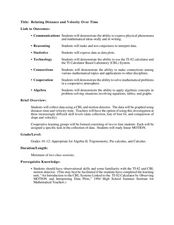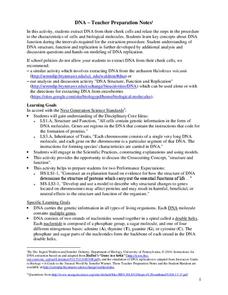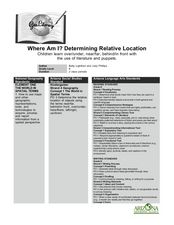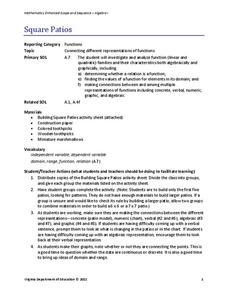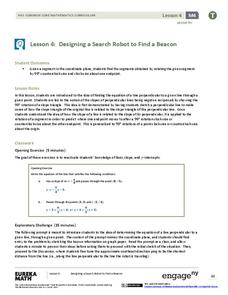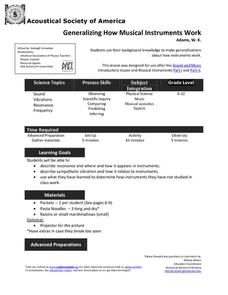Curated OER
Student Power Use
Students calculate the energy usage in their bedroom. In this physics lesson, students compare their energy consumption during school days and weekends. They recommend ways to save energy.
Curated OER
Relating Distance and Velocity Over Time
Students calculate the distance and velocity over time. In this algebra lesson, students graph a linear function to represent the distance vers time travel. They interpret their graphs and draw conclusion.
Curated OER
Teacher: Japanese Relocation/Internment
Fourth graders determine how executive orders affected individuals and families of mixed parentage. They relate evacuation to own life experiences.
Curated OER
Familiarizing Students with the Five Food Groups
Students identify an assortment of foods from all of the food groups, then discuss each type of foods' benefits and what happens to the body if it does not get these foods. They classify the foods according to the food groups.
Curated OER
Familiarizing Students with the 5 Food Groups
Students review a variety of foods and classify them into food groups. They identify the benefits of each food group to our bodies and consider how deficiencies of these groups affect humans. They sort pictures, view a video and write...
Curated OER
Students Exploring Cyberspace (SECs) Project
Students study AIDS and other current topics in a multinational, interdisciplinary fashion. They communicate with students from other countries throughout e-mail to find out how AIDS impacts other societies.
Curated OER
Fish, Fish: Teaching K Students About Things That Live in the Sea
Students participate in activities designed to help them connect the words to the animals they are studying. Octopus is reinforced through playing a game, "Octopus Tag." Students play a cooperation game of passing bean bags from student...
Curated OER
Activating Students Through Storytelling
Fourth graders produce a podcast of a elements of a Chinese folk tale. In this Chinese folk tale and podcasting lesson, 4th graders watch as the teacher performs Peach Blossom Spring: A Chinese folk tale. They decide on who will stay in...
Curated OER
Quadratic Relation and Parabola
Students identify the vertex and intercepts of a parabola. In this algebra lesson, students graph parabolas and factor quadratic equations. They perform transformation on the parabolas.
Curated OER
Extracting DNA from Your Cells - Teacher Preparation Notes
Students extract their own DNA from cheek cells. In this biology instructional activity, students explain the replication process. They identify the structure and composition of DNA.
Curated OER
Where Am I? Determining Relative Location
Students use position words to describe where their teacher is sitting and read a story that makes use of position words. In this spatial instructional activity, students make a stick puppet and play Simon Says focusing on using position...
EngageNY
Association Between Categorical Variables
Investigate associations between variables with two-way tables. Scholars continue their study of two-way tables and categorical variables in the 15th installment of a 21-part module. The lesson challenges them to calculate relative...
Curated OER
Day One Dance Workshop
Fifth graders complete a unit of lessons on the definition of dance. They view videos of various dances, compare/contrast the dances viewed, categorize a list of words about dance on a handout, write journal responses, and perform dance...
Curated OER
Reading in Context: The Diary of Anne Frank
Step into the hopeful and tragic world of Anne Frank with this activity on reading in context. After complete a variety of activities related to the first two scenes of The Diary of Anne Frank, eighth graders participate in a read aloud...
EngageNY
Angles Associated with Parallel Lines
Explore angle relationships created by parallel lines and transversals. The 13th lesson of 18 prompts scholars use transparency paper to discover angle relationships related to transversals. Learners find out that these angles pairs are...
Virginia Department of Education
Square Patios
Build a patio from toothpicks and marshmallows to analyze functions! Learners look for patterns in the data as they create different size patios. As they discover patterns, they make connections between the different representations of...
Curated OER
Picture This
A unique writing lesson, this plan begins with learners talking about multiculturalism in small groups. Each learner will choose a picture from a newspaper, describe it to their small group, and think about how it relates to...
EngageNY
Designing a Search Robot to Find a Beacon
Build right angles using coordinate geometry! Pupils explore the concept of slope related to perpendicular lines by examining 90-degree rotations of right triangles. Learners determine the slope of the hypotenuse becomes the opposite...
Curated OER
How Volcanoes Grow
Students create models of the three major types of volcanoes and determine how a volcano's shape is related to the type of material erupted. They then observe a demonstration that simulates the nature of two volcanic materials: lava and...
Acoustical Society of America
Generalizing How Musical Instruments Work
Sound, vibrations, resonance, and frequency are explored as learners use music to foster scientific inquiry. They engage in three different sound experiments and follow up discussions to foster a better understanding of how musical...
National Gallery of Canada
My World
Art can tell viewers about an artist's personality and background. Have your learners look at Inuit art and consider subject matter and how it relates to the artist and his or her world. The related art project requires pupils to create...
EngageNY
Adding and Subtracting Polynomials
Need a unique approach to adding and subtracting polynomials? A helpful math lesson plan approaches the concept by relating polynomials to base 10. It encourages pupils to see each term as having a specific value, and therefore, they...
EngageNY
Writing Equations Using Symbols
Build upon prior equation writing experience to create more complicated equations. Lesson one in a 33-part unit builds upon the class members' sixth and seventh grade experience of writing linear equations. Several examples provide...
Virginia Department of Education
Solar System Model
How many planets can you name? Did you get all 13 in our solar system, including the dwarf planets, or were you surprised when you read there are 13 planets? The instructional activity helps scholars understand the scale of the universe...



